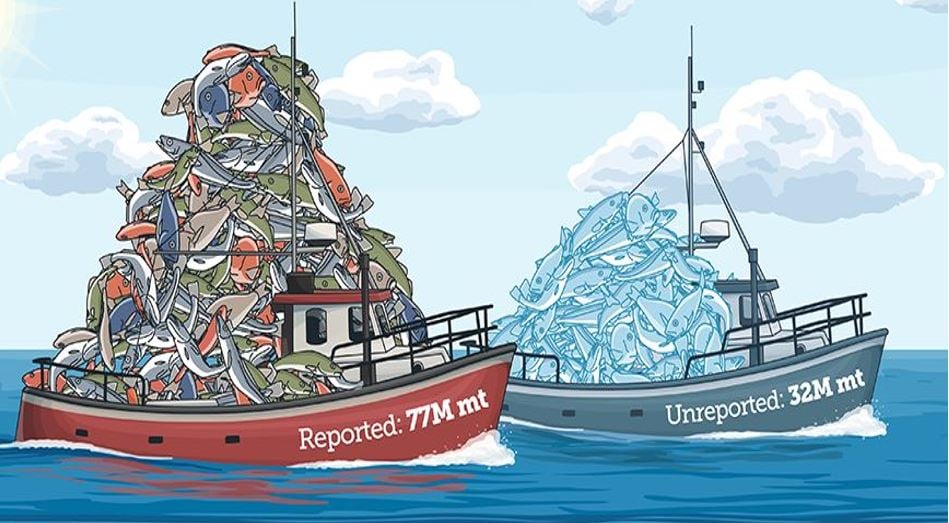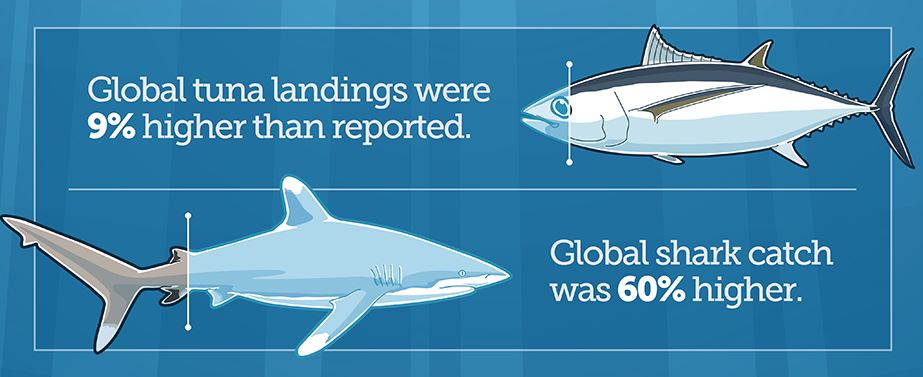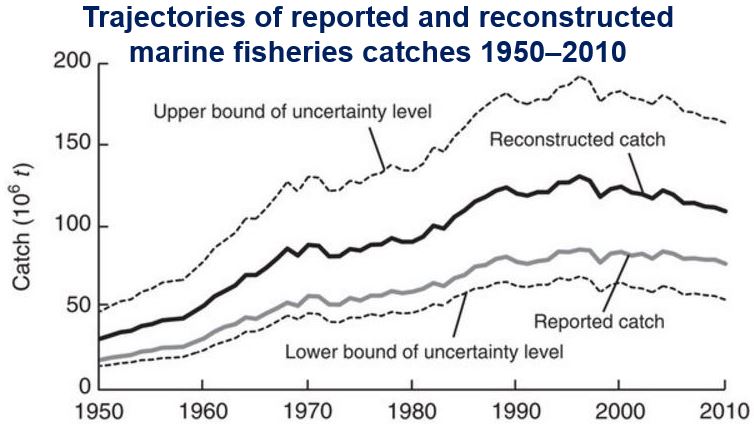Global fish catch data is drastically unreported, in fact by 32 billion kg every year, which is more than the combined weight of all the people in the United States, say two researchers from the University of British Columbia in Canada. In other words, people worldwide are catching considerably more fish than official figures suggest.
Prof. Daniel Pauly and Dr. Dirk Zeller wrote in the academic journal Nature Communications that the underreported figures obscure a significant decline in the total fish catch.
According to the new estimate, the annual global fish catch stands at approximately 109 billion kg (109 million metric tons), which is about 30% higher than the 77 billion reported by over 200 nations and territories in 2010.
 Without accurate fish catch data, it is impossible to know how to control global fish populations and determine which species require special protection. (Image: pewtrusts.org)
Without accurate fish catch data, it is impossible to know how to control global fish populations and determine which species require special protection. (Image: pewtrusts.org)
This means that 32 billion kg of fish are taken out of the sea each year and never reported.
Reporting data too narrowly focused
A research team, led by the Sea Around Us, an initiative at the University of British Columbia backed by the Pew Charitable Trust and Vulcan Inc., says the underreporting has occurred because the majority of countries focus their data collection efforts on industrial fishing and generally exclude hard-to-track categories such as illegal fishing, discarded fish and artisanal subsistence.
Lead author, Prof. Pauly, principal investigator of the Sea Around Us, said:
“The world is withdrawing from a joint bank account of fish without knowing what has been withdrawn or the remaining balance. Better estimating the amount we’re taking out can help ensure there is enough fish to sustain us in the future.”
In order for fisheries officials and managers to properly assess the health of fish populations and inform fish policies such as catch quotas and area or seasonal restrictions, accurate fish catch data is crucial.
Massive global review of fish catch data
Prof. Pauly, Dr. Zeller and hundreds of their colleagues across the world reviewed catch and related information from over 200 countries and territories.
 Underreporting of catches is widespread, affecting virtually every species in the sea. (Image: pewtrusts.org)
Underreporting of catches is widespread, affecting virtually every species in the sea. (Image: pewtrusts.org)
Using a catch reconstruction method – a bit like putting all the pieces of a giant jig-saw puzzle together – they compared the official data submitted to the United Nations Food and Agriculture Organization (FAO) with estimates obtained from a wide range of sources, including local fisheries experts, fisheries law enforcement, human populations, industrial fishing statistics, academic literature, and other records such as documentation of fish caught by tourists.
Joshua S. Reichert, executive vice president and head of environment initiatives for Pew, said:
“This groundbreaking study confirms that we are taking far more fish from our oceans than the official data suggest. It’s no longer acceptable to mark down artisanal, subsistence, or bycatch catch data as a zero in the official record books.”
“These new estimates provide countries with more accurate assessments of catch levels than we have ever had,” said Reichert, “along with a far more nuanced portrait of the amount of fish that are being removed from the world’s oceans each year.”
 Difference between the world’s marine fisheries catches assembled by FAO from voluntary submissions by its member nations (‘reported’) and that of the catch ‘reconstructed’ to include all fisheries known to exist, in all nations and in the High Sea (‘reconstructed’ = ‘reported’ + estimates of ‘unreported’). (Image: nature.com)
Difference between the world’s marine fisheries catches assembled by FAO from voluntary submissions by its member nations (‘reported’) and that of the catch ‘reconstructed’ to include all fisheries known to exist, in all nations and in the High Sea (‘reconstructed’ = ‘reported’ + estimates of ‘unreported’). (Image: nature.com)
Raechel Waters, senior program officer for ocean health for Vulcan Inc., said:
“Data are integral to maintaining global fisheries. Without an accurate understanding of fish catch, we risk underreporting or misreporting, which can handicap countries in their efforts to implement effective fisheries policy and management measures.”
“This is particularly important for countries that do not have the resources to conduct comprehensive fishery assessments.”
In an Abstract in the journal, the authors wrote:
“The differing trajectories documented here suggest a need for improved monitoring of all fisheries, including often neglected small-scale fisheries, and illegal and other problematic fisheries, as well as discarded bycatch.”
The Sea Around Us assesses the impact of fisheries on the marine ecosystems globally, and offers solutions on minimizing the effects to a range of stakeholders. The project was set up by the Pew Charitable Trust in 1999.
In 2014, the Sea Around Us also started a collaboration with Vulcan Inc. to provide Asian and African countries with more comprehensive and accurate fisheries data.
Citation: “Catch reconstructions reveal that global marine fisheries catches are higher than reported and declining,” Daniel Pauly & Dirk Zeller. Nature Communications 7, Article number: 10244. 19 January, 2016. DOI:10.1038/ncomms10244
Video – Reconstructing the fish catch
Similar to the way we piece together a 500-piece jigsaw puzzle or gather evidence to solve a mystery, researchers are looking for missing catch data in the long shadows cast by fishing activities that are currently not reported around the world. Fisheries experts have long recognized the importance of comprehensive, accurate catch data to understand the pressures on target species. However, it is often difficult to collect such data.
